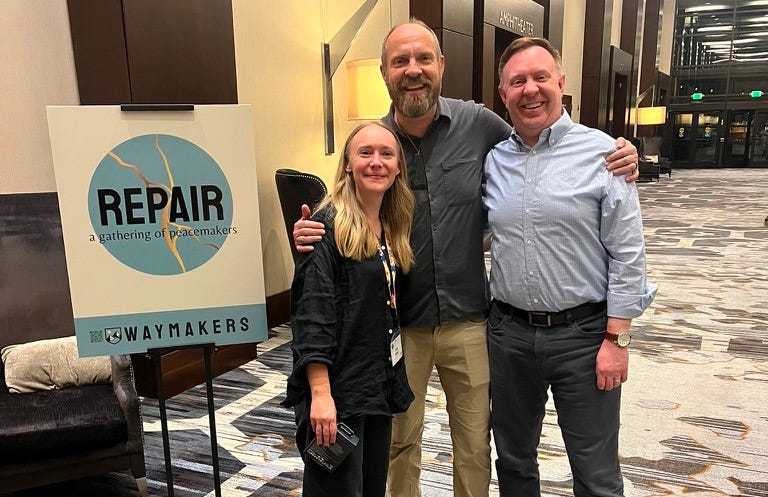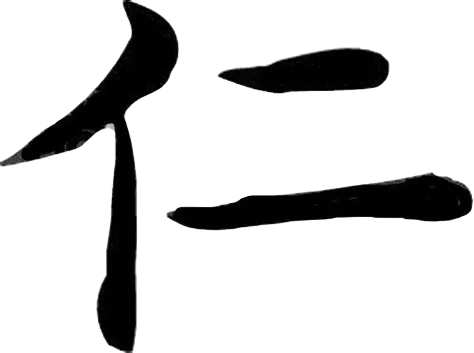Do not Squander this Precious, Irreplaceable Moment
Reflections from REPAIR on ren and the art of learning how to lean into the humanity in the room
Twelve hours deep into facilitating workshops at REPAIR this weekend, I did something I haven’t done in a long time in a workshop.
I stopped being a teacher.
I was facilitating a workshop with Patrick Mason and Katie Searle on navigating faith transition. Patrick began the session brilliantly, explaining the data and helping the audience understand the trends and reasons behind faith transition. He ended with a beautiful re-telling of the Prodigal Son story.
Katie came up next. She spoke about her own faith transition in the most vulnerable way possible. She reminded us of both the fragility of change and the bravery it takes to find truth and belonging, especially when that means making choices that ask ourselves and others to leave behind old versions of ourselves. There were tears flowing as Katie, in her own graceful way, reminded us what it means to be human.
We took a break. I was up next. I had slides. I was ready to talk about “tools” on how we navigate faith transitions with partners, children, parents, and friends. I was going to tell a quick story about my first child and their faith transition from the perspective of a father and then dig into skills training.
None of what I prepared felt right.
I could sense the audience was hurting. I could see that the information and the story Katie told were reassuring and healing.
But there was still so much pain in the room. I could feel it.
And I no longer felt like teaching. I yearned to be with the people in the room — all of whom had shown up courageously for a weekend of training on how to repair their relationships. This may have been the most sensitive topic of the two-day event. Everyone, earlier in the workshop, had a chance to respond to some questions about why they were there.
They asked for hope. But hope planted in something real. Planted in the soil of pain.
I remembered Jim Ferrell’s keynote speech on his new book “You and We” that kicked off the conference.
Toward the end of the book Jim writes:
“To understand relation is to understand that you, me, and all the other people in our lives are not static, separate things but bundles of relation—bundles of relation relating to and influencing each other. We’re more like verbs than nouns, events rather than things. Ever encounter changes the dynamic of who we are. And, interestingly, of who we have been.”
That two hours together had changed something inside of me. Being in that room, relating to Patrick, to Katie, to former students, current friends, and a lot of new faces … their hope, their pain, was actively transforming me.
When I teach, too often, I am a noun. I wanted to be a verb.
Jim ends the book with this quote from philosopher Martin Buber: “Many . . . acquire relations which they do not make real, that is, which they do not use to open themselves to another; they squander the most precious, irreplaceable, and irrecoverable material; they pass their life by.”
I did not want to squander this precious, irreplaceable moment.
So I put aside the teaching material for the day. I sat down. I told stories I had never told before about my pain, and hope, and grief and joy. And then I spent the next hour sitting next to and listening to those same stories from others in the room.
The emotion of it all was overwhelming. I put my arm around people. I held someone’s hand. I wiped tears from my eyes and felt my soul and the soul of others continue to transform.
This hotel conference room felt sacred to me — a temple to the least of these who are hurting and seeking repair.
Wrote one participant after the workshop:
“I’m still metabolizing this session - it was by far the most abundant, enlightening, complex, raw, painful, cathartic, and oddly hopeful session of the entire conference. The data surprised, unsettled, and comforted me. The deeply personal journeys changed me on a cellular level. And the transformation from grief to growth in an hour shocked me - this collective and individual journey from fear, pain, tension, exhaustion to possibility, clarity, hope, compassion, empowerment, action, and grace was one of the most intense inside-out transformation experiences of my life. [This is what] conflict transformation looks like and how we can literally sit with others in theirs.”
As I’ve pondered the experience the past few days, I’m reminded of the teachings of Confucius. His central teaching was “ren”—a term that appears more than one hundred times in his writings, the Analects. “This cardinal Confucian virtue,” writes Stephen Prothero in his book Religion Matters, “is usually translated as benevolence, but it is also rendered as humaneness, goodness, kindness, human-heartedness, humanity, altruism, and fellow-feeling.”
The Chinese character for ren is composed of two parts. On the left is the character representing a human being. On the right are two lines that represent the number two.
Someone who possesses the virtue of ren understands that human beings do not stand alone. Writes philosopher Herbert Fingarette, “For Confucius, unless there are at least two human beings, there can be no human being.”
In that moment, I don’t ever think I’ve understood ren, or the concepts Jim was teaching us in You and We more clearly. Together, we were more than the sum of our parts. To quote Jim, we were “compounding”.
“At this level, people open themselves to each other’s goals and realities, integrating them with their own. As a result, other people are no longer ‘over there’ — separate entities with whom we can cooperate across our divides—but are rather within us in meaningful ways.”
So, I want to thank all of the people who helped compounding happen at REPAIR.
Thank you to our sponsors Faith Matters, the One America Movement, and the Church of Jesus Christ of Latter-day Saints for believing in and supporting this work.
Thank you to our talented, creative, and passionate workshop presenters — Jim Ferrell, Patrick Mason, Katie Searle, Jennifer Finlayson-Fife, Desmond Lomax, LaShawn Williams, Thomas McConkie, Seamus Fitzgerald, Amanda Ford, Melissa Mason, David Pulsipher, Jen Thomas, Emma Addams, Nanette Antwi-Donkor, and Frederick Reeves — who put so much time and spirit into their workshops.
And, most importantly, thank you to the people who showed up this weekend looking for hope and the tools to get there. Something larger than the sum of our parts took hold. There was a spirit in the room that transcended the polarization and contempt of our time.
I walked away with ren in my veins, and four days later, it is still pumping in spirit and truth.





Thank you. My wife and I volunteer at the Utah State Prison. We work with a cohort of men finding a way out of their mental, emotional, physical, educational and spiritual prisons while knowing they will be incarcerated for years to come. This week they were experiencing upset individually and as a group. This is not unusual. As they shared, I told them there is no way I could relate to being in prison or the lives that led them to that point. I would not pretend to understand. Then, in part inspired by your vulnerability, I shared with the men part of our family story that includes two children that experienced severe trauma through the acts of others. I shared that my pain was at times irreconcilable but that I would not abandon my faith, hope and forgiving heart that comes through a loving Savior and what he did and does for me, my children, and those who had victimized them. It was a loving and connecting moment between us and those who had also been both victims and victimizers themselves. Thank you Chad for being vulnerable and providing me a powerful dose of courage and humanity to connect with 20 men who needed to know that those on the ‘outside’ had an inside that had experiences similar to their own and could love them as they are.
I wish I could have been in that room to experience this with you, Chad. I was so grateful for the time I was able to spend at the conference on Thursday evening, and for all the people who brought their full selves into that space so that it could open up into something transformative. What a beautiful thing you, Patrick, and Katie have begun with Repair. May it continue and grow.